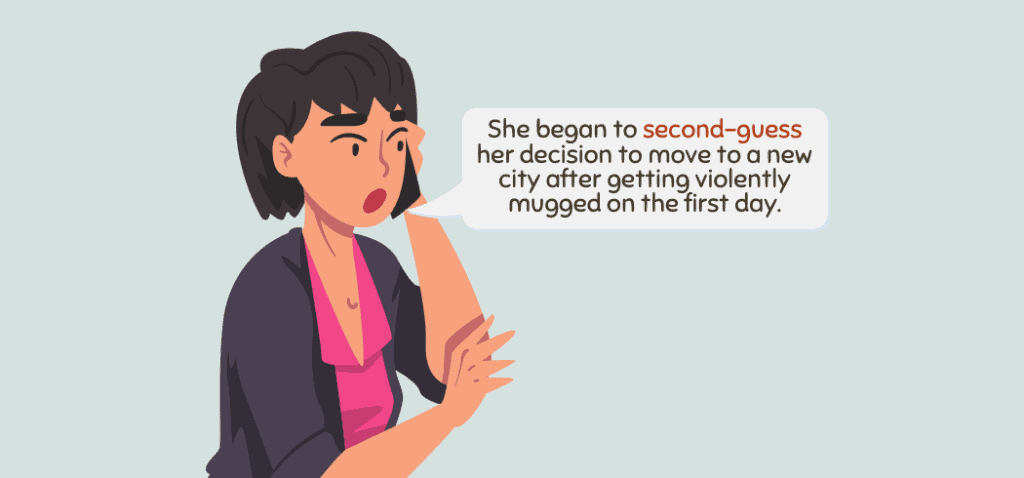Are you horrible for second-guessing yourself? Do you make choices and then rethink them afterward? Wait, you don’t know what the word means? Well, hang tight and read on as I explain the definition of “second-guess” and show you how to use it in a sentence.
Second-Guess Meaning

When you question or just doubt a decision that’s already been made, you’ve second-guessed it. The term implies a lack of confidence in the first choice or at least a feeling of uncertainty about it. You can apply the term to just about anything from your personal relationships to work life or just everyday decision-making like what to make for dinner.
Difference Between Guess and Second-Guess
They might seem similar, or at least variations of one another, but there’s a big difference. To guess something or to make a guess means that you don’t know the outcome or answer; you’re just taking a guess at what it might be. It’s like a hypothesis or estimation.
Second-guess is what you’d do if you knew the answer and are now rethinking it. It’s like if you decided to make meatloaf for supper, but after defrosting the meat, you’re no longer in the mood for meatloaf. That’s what second-guessing is.
Is “Second Guess” Hyphenated?
Knowing which spelling of “second-guess” to use depends on its function in your sentence. When using it as a noun, you should write it as two words without a hyphen.
- Would you like to take a second guess at the answer?
But the term is almost always used as a verb or adjective, in which case you’d hyphenate it because it’s a compound word.
- I’m second-guessing my choice to wear white to the beach.
- If you wait too long, you’ll second-guess it.
Is Second-Guessing Good or Bad?
Like most words and phrases, the fact of whether it’s good or bad wholly depends on the context you’re using it for. With “second-guess,” you can use it to encourage critical thinking and improve decision-making, urging yourself or others not to make rash choices.
I don’t feel that it could ever have a negative or “bad” connotation, but it can be used to show your indecision and anxiety toward something.
What Is Another Word for Second Guessing?
- Doubting
- Questioning
- Reconsidering
- Re-evaluating
- Reassessing
- Rethinking
- Hesitating
Second-Guess Examples in a Sentence

- When I first made a choice to go full-time with writing and leave behind the world of Interior Design, I second-guessed it for a while, but I am now glad I did it.
- Danielle began to second-guess her decision to move to a new city after getting violently mugged on the first day.
- We invited my whole family to stay during the holidays, and I second-guessed it the entire time, but looking back now, I’m glad we did it.
- As a lead manager, it’s important not to second-guess every decision you make because it undermines your authority and confidence in front of your workers.
- Tests make me so nervous that I often second-guess my answers, even when I’m fairly sure they’re correct.
Don’t Second-Guess It
I hope my little guide helped explain the true meaning of the term “second-guess.” As I said, you can use it whenever you want to show hesitation or rethinking of your choice. It can be applied to pretty much any situation, and you only need to hyphenate it when it’s a noun or adjective.
Related Articles:
